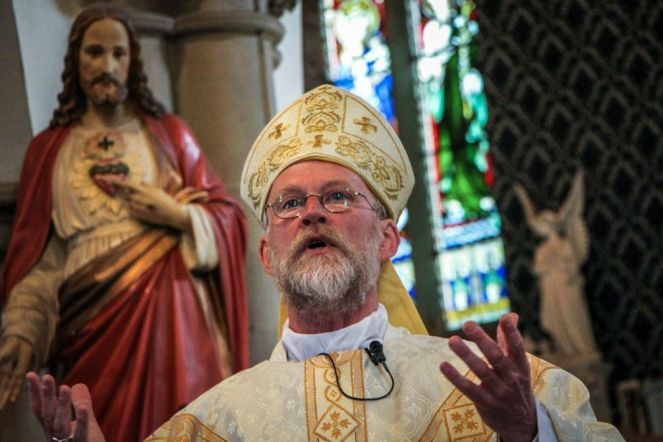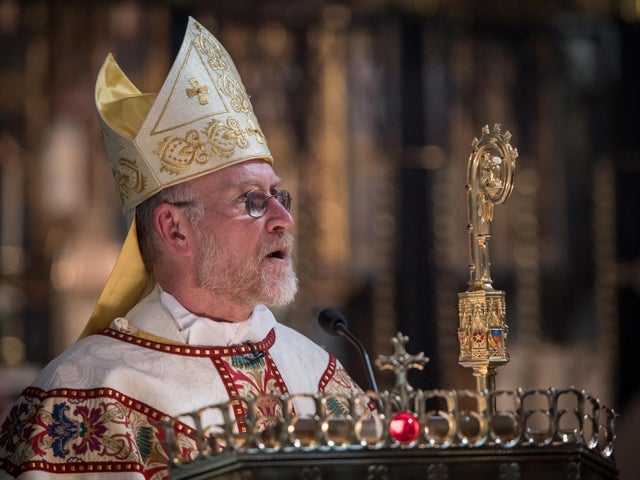Dear friends in Christ,
Welcome to this week’s Bishop’s Blog!We have an answer to prayer as we now prepare to welcome the Faithful back into our churches for the public celebration of Holy Mass, albeit with many restrictions still in place. The ‘hoops’ through which we must leap will serve to show our love for the Mass, Christ’s supreme gift to the Church. Feast Days are a strong feature of our Catholic heritage. Apart from the Liturgical year itself, we have days devoted to the memory of particular men and women and children who have left us moving and outstanding examples of faithful lives. This past week has been delightful. Saints Thomas More and John Fisher, the birth of Saint John the Baptist, Our Lady of Fernyhalgh have all appeared in the calendar, and invited us to spend time in their company.
Feast Days are a strong feature of our Catholic heritage. Apart from the Liturgical year itself, we have days devoted to the memory of particular men and women and children who have left us moving and outstanding examples of faithful lives. This past week has been delightful. Saints Thomas More and John Fisher, the birth of Saint John the Baptist, Our Lady of Fernyhalgh have all appeared in the calendar, and invited us to spend time in their company. Today we mark a double celebration, remembering two giants of Christ’s disciples, St.Peter and St.Paul. they could so easily have divided the early Christians. Instead, they are found working together to establish the Church. St.Peter, the first Pope, the rock on which the Church is founded; St.Paul, the architect of the structure built on that rock.Without Peter, Paul, for all his hard work, would have been building on sand. It is to his eternal credit that he realised this and acknowledged Peter’s Christ-given authority. It is to the credit of those early leaders of the Church that we remember these great saints complementing one another, not in competition with each other. At the time I was called to be Bishop of Lancaster early in 2018 I didn’t have a passport. It had lapsed in 2014 and I saw no need to renew it. All of a sudden life changed. A trip to Rome was looming, a place I had never visited, and to be honest, had no great desire to visit. Someone once said, ‘If you are prone to sea-sickness you should stay away from the engine room’! I had enough to sustain my life as a faithful Catholic here in the UK. The trip to Rome was not my idea, it had come from elsewhere. But then, I remembered old photos Dad had shown us from his war years. He had been here. I was following in his footsteps. That changed things a lot. Three nights in Rome in February. Grey, wet, cool and quiet. The Holy Father was away on his Lenten retreat, so we stayed at his place, Domus Sanctae Marthae. We made time to visit the tombs of Saint Peter and Saint Paul. It takes time to appreciate the significance of these places. You bring them home with you. These Saints still serve Christ; they bring us closer to our Christian roots, giving a sense of what we are part of. Beyond that, they will not rest until we have each opened our hearts to Jesus Christ, the Lord.
Today we mark a double celebration, remembering two giants of Christ’s disciples, St.Peter and St.Paul. they could so easily have divided the early Christians. Instead, they are found working together to establish the Church. St.Peter, the first Pope, the rock on which the Church is founded; St.Paul, the architect of the structure built on that rock.Without Peter, Paul, for all his hard work, would have been building on sand. It is to his eternal credit that he realised this and acknowledged Peter’s Christ-given authority. It is to the credit of those early leaders of the Church that we remember these great saints complementing one another, not in competition with each other. At the time I was called to be Bishop of Lancaster early in 2018 I didn’t have a passport. It had lapsed in 2014 and I saw no need to renew it. All of a sudden life changed. A trip to Rome was looming, a place I had never visited, and to be honest, had no great desire to visit. Someone once said, ‘If you are prone to sea-sickness you should stay away from the engine room’! I had enough to sustain my life as a faithful Catholic here in the UK. The trip to Rome was not my idea, it had come from elsewhere. But then, I remembered old photos Dad had shown us from his war years. He had been here. I was following in his footsteps. That changed things a lot. Three nights in Rome in February. Grey, wet, cool and quiet. The Holy Father was away on his Lenten retreat, so we stayed at his place, Domus Sanctae Marthae. We made time to visit the tombs of Saint Peter and Saint Paul. It takes time to appreciate the significance of these places. You bring them home with you. These Saints still serve Christ; they bring us closer to our Christian roots, giving a sense of what we are part of. Beyond that, they will not rest until we have each opened our hearts to Jesus Christ, the Lord.
They also invite us to overcome our often petty, sometimes serious, differences in order to remain true to our Saviour.
Saint Peter, rock on which Christ founded His Church, pray for us.
Saint Paul, foremost teacher of the Catholic Faith, pray for us.
Paul Swarbrick





You must be logged in to post a comment.